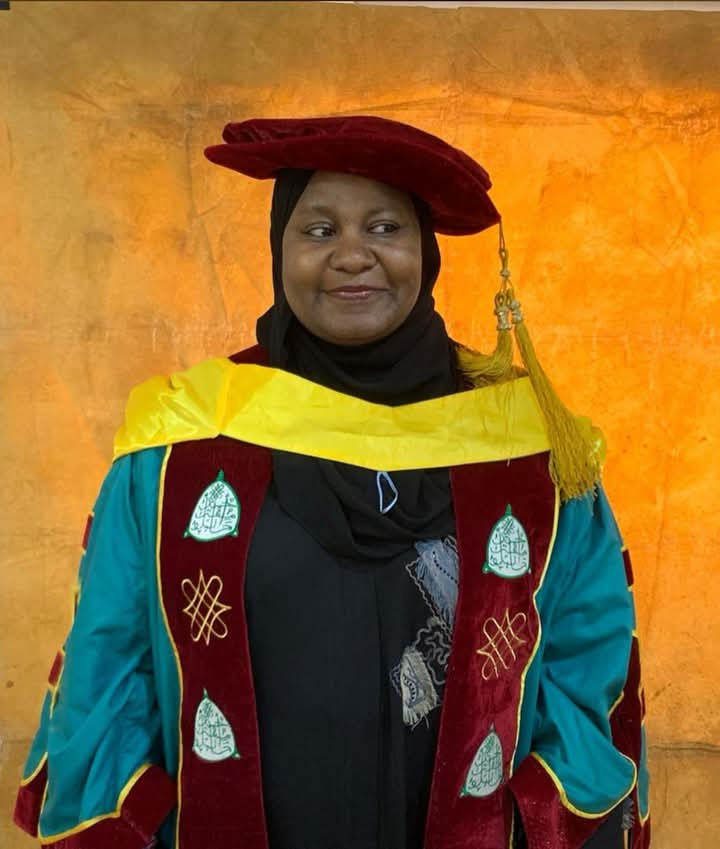By Farooq A. Kperogi
Please join me to raise a glass to celebrate Hadiza Usman Ma’aji, whom the Senate of Ahmadu Bello University, Zaria, has just promoted to the rank of professor.
With that vote, she becomes the first woman from northern Nigeria to reach the rank of professor of clinical pharmacy. It’s a milestone that deserves a little song and dance, as Brits say it.
I am writing about Professor Hadiza Uman Ma’aji for two very personal reasons. First, she’s the wife of one of my best friends (who has actually been more brother than friend) and former classmate at Bayero University, Kano, by the name of Aliyu Ma’aji who holds the traditional title of Ma’ajin Zazzau (i.e., Treasurer of the Zaria Emirate).
Since our undergraduate days at Bayero University in Kano, Aliyu has been a confidant and an extension of my family. When we were both editors at the Daily Trust in the early 2000s, we even shared a room, although we were each allocated separate two-bedroom apartments. I remember when he was courting Hadiza and the joy of attending their wedding in Zaria in 2004.
The second reason is bigger than friendship. Professor Hadiza Ma’aji’s journey shatters the stubborn, false dilemma that suggests that northern Nigerian women must choose between family and professional ambition, as if the two are incompatible.
A Fulani daughter of the Zaria grasslands (Hadiza’s family still keeps herds of cattle) has combined scholarship, marriage, and motherhood with remarkable success.
Today she’s the HOD of ABU’s Department of Clinical Pharmacy while raising four whip‑smart children.
She married Aliyu in the middle of her final exams, the last lap of a grueling five‑year pharmacy program. Yet she finished top of her class.
By her national‑youth‑service year in 2005 she was tenderly balancing baby Maryam (now a 20-year 400‑level law student) against the demands of national service.
Graduate school did not slow her. In 2008, pregnant with her second child, she tackled a master’s degree at the University of Ibadan. The Lagos‑Ibadan expressway became her classroom on wheels.
The rigors of academic work and the pangs of pregnancy forced her to a hospital bed at the University College Hospital (UCH), Ibadan, where she endured three weeks of doctor‑ordered rest before jumping back into lab work.
She had her fourth child while pursuing her PhD at the University of Nigeria, Nsukka. At one point, baby Ummusalmah voluntarily weaned herself after a long absence from her mother due to a project defense. Talk about a 1-year-old making a big sacrifice, as if she somehow knew her mummy was on the hot seat!
Hadiza’s time in Nsukka yielded one of my favorite anecdotes. Draped daily in long black abayas, she sparked hushed whispers on campus. People on campus thought she was quietly writhing in inconsolably perpetual mourning because of the loss of a loved one, which explained the sporadic glances of sympathy she got from strangers on campus.
Months passed before a colleague dared to ask which relative of hers had died. Her laughter echoed through the corridor. In the North, she explained, black is simply clothing, not a statement of grief. Mystery solved.
Not once in her academic odyssey did she ever retreat to off‑campus comfort even though her husband could afford it, particularly during her graduate studies. She intentionally chose on-campus housing.
That decision, informed by both humility and curiosity, has made her a genuine national rather than regional scholar. She might have stayed at ABU for every degree; instead, she planted herself in top southern universities, learning new accents, cuisines, and rainy‑season rhythms along the way.
What emerges is a portrait of an uncommonly balanced life: rigorous researcher, inventive teacher, steadfast wife, affectionate mother, and a cosmopolitan Nigerian. The ABU senate’s elevation is only the latest affirmation of a career that still feels like it’s gathering steam.
Professor Hadiza Usman Ma’aji is, in every sense, proof that the ceiling is made of nothing sturdier than outdated opinion.
Higher responsibilities will find her soon enough because she is that rare national treasure who invites trust across divides.
I say this not because she is my friend’s wife, but because, titles aside, her story is the antidote to the false choices still peddled to young women in our part of the world. May Professor Hadiza Ma’aji’s example travel far.

